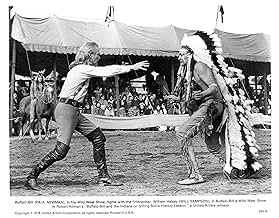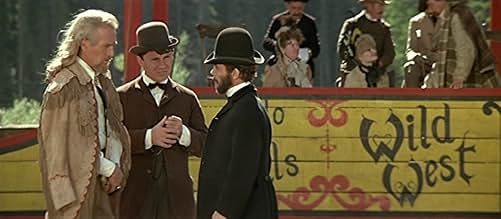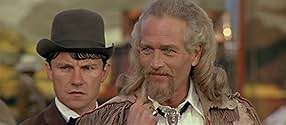Buffalo Bill et les Indiens
- 1976
- Tous publics
- 2h 3min
Ajouter une intrigue dans votre langueA cynical Buffalo Bill hires Sitting Bull to exploit him and add his credibility to the distorted view of history presented in his Wild West Show.A cynical Buffalo Bill hires Sitting Bull to exploit him and add his credibility to the distorted view of history presented in his Wild West Show.A cynical Buffalo Bill hires Sitting Bull to exploit him and add his credibility to the distorted view of history presented in his Wild West Show.
- Réalisation
- Scénario
- Casting principal
- Récompenses
- 1 victoire au total
- Prentiss Ingraham
- (as Allan Nicholls)
- Oswald Dart
- (as Robert Doqui)
Avis à la une
We meet a fantastic cast of characters, played by many of the best actors around giving wonderful performances. Among them are Joel Grey, Kevin McCarthy, Burt Lancaster, Harvey Keitel (really playing against type as Bill's goofy, childlike nephew), and Geraldine Chaplin (as Annie Oakley). Everyone, including Buffalo Bill himself, is deftly characterized in a very Altmanesque way. They wander through a semi-story, often seen and heard only in glimpses. Chaplin in particular, who gives probably the most memorable performance in the film, has very few lines. Mostly she characterizes Annie through her face. The Wild West Show is becoming more and more popular, and grossing more and more money. Their newest attraction is Sitting Bull, the man who famously defeated George Custer at Wounded Knee several years earlier. To have Sitting Bull for his show makes Bill extremely proud. In his mind, he has now defeated and subjugated the one Indian who really gave the white man a run for his money, and, by doing so, he has single-handedly tamed the West. Unfortunately for him, Sitting Bull is no subject. He has only joined the show because he has dreamed that, if in the show, he would get to meet President Grover Cleveland. We only once see Sitting Bull speak, when he attempts to talk to Cleveland. The rest of the time, his servant, Halsey (Will Sampson, from One Flew Over the Cuckoo's Nest), speaks for him. While he's participating in the show, he wants to change it in order to make it more factual.
Altman's detractors will have a field day with Buffalo Bill and the Indians. The biggest complaint against the director, as it seems to me, is that he is overly cynical and hates his characters. I'll admit that that is sometimes true, but I also think that the detractors see that aspect where it just doesn't exist. It does exist in this film, however. Buffalo Bill is most certainly a target for derision. Most of the action in the film revolves around the man being humiliated by Sitting Bull. Bill thinks he's the greatest adventurer who ever lived, and the film delights in having him showed up by the Sioux chief. I do not believe that it is an artistically invalid to have a character as the central target of a satire. Network, made the same year, has Faye Dunnaway, for instance. Who can like her by the end of the film. The difference is, I suppose, that Dunnaway wins some pathos by the end of the film. Maybe that's a difference, anyway. Buffalo Bill might have a bit of it by the end of the film, I think.
The character of Buffalo Bill is a wonderful satirical target because he really exists in such a state of absurdity. Once a genuine American military hero, Bill Cody wrapped up his entire experience and put it inside a bottle. In that bottle, the Wild West grew more and more fantastic, and less and less real. The environment is controlled, the goings on are fake, and any bit of history is freely created. It's not unfair, I suppose, to say Buffalo Bill and the Indians has a somewhat simplistic revisionist history behind it, but, in a big way, it is itself about revisionist history. Buffalo Bill Cody was revising history, creating entertainment out of true, historical human misery. And that's not only the suffering of the Native Americans, which is at the forefront of the film, of course, but also white settlers. The film begins with a rehearsal of an Indian raid on homesteaders. The bigger message is that was what Hollywood did, as well.
Bill likes his world, loves it, in fact. It is a celebration of his ego (the film often focuses on the gigantic portraits of Bill, which certainly would garner much criticism from some people and I would agree that it's not particularly subtle, but I would also say that it is pretty funny at times). Sitting Bull, one of the greatest Indian leaders and, from most accounts, an enormously clever and skilled man, completely undermines Bill's superiority as soon as he arrives. A blowhard as big as Buffalo Bill deflates pretty easily. Sitting Bull's presence also works to make Bill finally look around himself and begin to question the false world he has erected around himself. This thread of the film is resolved, at least as regards the narrative, in the climactic sequence, where Bill encounters Sitting Bull in a dream. This sequence is probably the low point of the film, I think. It more or less spells out everything that the film has been building to, and it doesn't really accomplish anything new. We know Altman for his amazing and original climaxes, and this one is certainly not one of his best. Still, it does work in a strictly functional way, and it is followed by a truly interesting and exquisite final sequence. This final sequence, which I won't discuss in this review, is not merely restating what has already come before, as I believe many viewers will take it. This, I think, is where the character of Buffalo Bill claims his pathos. Paul Newman's eyes in that final close-up are both frightening and quite sad, in any number of ways. Any film as shallow as many people like to claim this one is would never have given rise to this much depth in one man's expression. If you watch it and don't see it, I really think you've missed the point.
Even if you don't buy into the content of Buffalo Bill and the Indians, it's hard to imagine being unimpressed by Altman's direction or any of the other technical aspects of the film. Many claim it to be a bore, but I think Altman was just light years ahead of his audience at times. It's very entertaining and especially very funny at times. There are any number of masterful sequences. In my opinion, it is second in achievement only to Nashville.
The reason why Buffalo Bill sustained an enduring popularity was because he really did have a background that was colorful and exciting. He was a kid raised in Nebraska frontier territory who ran away to escape hard times and was one of the young riders for the short lived and legendary pony express. He had real exploits in that, as a buffalo hunter (hence the name)and an army scout. He won the Congressional Medal of Honor and did kill Cheyenne Chief Yellow Hand in single combat.
But a lot of people in those days could have shown similar resumes. What set Cody apart was his discovery by Ned Buntline who wrote those dime novels who created all the mythology around him. Buntline was in need of a new hero, his previous literary Parsifal Wild Bill Hickok had fallen out with him. Buntline later wrote about Wyatt Earp, Jesse James, Billy the Kid, just about every colorful character our old west produced. His dime novels for better or worse created the characters.
The greatest weakness in the film is Burt Lancaster's portrayal of Buntline. Not taking anything away from Lancaster because I'm sure he was taking direction and working within the parameters of the script and the original Broadway play Indians upon which Buffalo Bill and the Indians is based. But Lancaster plays it like the elderly Robert Stroud. The real Buntline was more like Elmer Gantry.
Paul Newman as Cody however gives one of the best interpretations of Buffalo Bill seen on film. He's a man trapped in his own legend, but he's smart enough to know what's real and what's phony in his world, including himself. He knows behind all the ballyhoo and hoopla of his Wild West Show, there's a man who did not always know ease and comfort.
The original play Indians ran for 96 performances on Broadway and starred Stacy Keach as Cody. It was far more involved and had Hickok, Billy the Kid, and Jesse James as characters. Author Arthur Koppit trimmed it down so it had more coherency for the screen.
As we know from Annie Get Your Gun, Sitting Bull was briefly part of Cody's Wild West Show. But here the attention is focused on Frank Kaquitts who in his one and only film plays an impassive Sitting Bull, who's doing Cody's show to gain food and supply from the government for his people. In fact Cody now the total show business creation is more impressed with Will Sampson who's well over six feet tall and is better typecast as the savage Indian. There's nothing terribly savage about either of them now.
Look for good performances from Geraldine Chaplin as Annie Oakley who in real life as well as in Annie Get Your Gun befriended Sitting Bull and from Joel Grey as Nate Salisbury, Cody's business partner and Kevin McCarthy as John Burke, the publicist for the Wild West Show. They continued what Buntline started in creating the Buffalo Bill mythology.
Buffalo Bill and the Indians is not the best film of Robert Altman or Paul Newman. It's certainly a lot better than the science fiction film Quintet that they did later. It's a good study of how in America our western mythology got its start.
Performance-wise who knew that Harvey Keitel was in this movie at all? He gives a memorably tiny performance, low key and inconspicuously funny as heck. Joel Grey plays one of the parts that would be given to Bob Balaban in more recent years, not really adding much to it. Burt Lancaster gives rich character to essentially a narrator and commentator. Newman's performance doesn't unbalance this film nearly as much as it did Altman's `Quintet' (both genre-wise and scriptwise, it was almost a character study), but it does show why Altman is more successful with a giant cast of B actors, or one main character that is content to listen and react more than speak, than with superstars.
The stage play is much much different. It focuses much more explicitly on the atrocities and hypocrisies committed. Sitting Bull speaks, quite a bit, and believes Buffalo Bill to be his friend. Buffalo Bill is ineffectual, and the one person most responsible for the extinction of the Buffalos the Indians once hunted (it would have been nice if they'd at least mentioned how he got the name Buffalo Bill, he killed thousands and thousands). Of the two, I prefer the movie, but wish Altman had shown a little more responsibility toward historical record.
This is a confusing and complex movie, alternately very subtle and prone to brash sometimes annoying running gags (the mezzos singing in the background are particularly cloying) and it is no surprise that people didn't know what to think of it. I'm just glad it is out on DVD so people can see an excellent representation of it and make up their own minds.
All of Altman's films have the feel of coming together in the editing room, and many times this approach to structure results in inspired moments, but "Buffalo Bill" feels even more than usual like a film without a center. There's no narrative thread to hold it together, so it has a wandering and monotonous quality. Also, it doesn't help that Altman's shooting style is uncharacteristically distant. There are virtually no close-ups in the entire picture, so scene after scene is photographed in medium and long shots. Both the screenplay and the camera keep us at a distance; as a result, we never become engaged in the action.
A definitive misfire.
Grade: C
Le saviez-vous
- AnecdotesThe full-length portrait of Buffalo Bill astride his horse, that appears several times in the film, is based closely on a similar portrait by the French artist Rosa Bonheur, which hangs in the Buffalo Bill Historical Center in Cody, Wyoming.
- GaffesSitting Bull joined Cody's show in 1885. The performing arena shows several Wyoming state flags, but Wyoming wasn't granted statehood until 1890, and that flag wasn't adopted until 1917.
- Citations
William F. 'Buffalo Bill' Cody: My daddy was killed tryin' to keep slavery outta Kansas.
Oswald Dart: How'd he do that, sir?
William F. 'Buffalo Bill' Cody: Well, my daddy hated slavery with such a passion, that rather than let the coloreds get in to becomin' slaves, he just fought to keep 'em all out of the state.
- Crédits fousRobert Altman's Absolutely Unique and Heroic Enterprise of Inimitable Lustrel
- ConnexionsFeatured in Luck, Trust & Ketchup: Robert Altman in Carver Country (1993)
- Bandes originalesQui sola vergin rosa
Composed by Friedrich von Flotow
From his opera "Martha"
Performed by Evelyn Lear
Meilleurs choix
Détails
- Date de sortie
- Pays d’origine
- Site officiel
- Langue
- Aussi connu sous le nom de
- Buffalo Bill and the Indians
- Lieux de tournage
- Sociétés de production
- Voir plus de crédits d'entreprise sur IMDbPro
Box-office
- Budget
- 7 100 000 $US (estimé)
- Durée
- 2h 3min(123 min)
- Couleur
- Mixage
- Rapport de forme
- 2.35 : 1






















